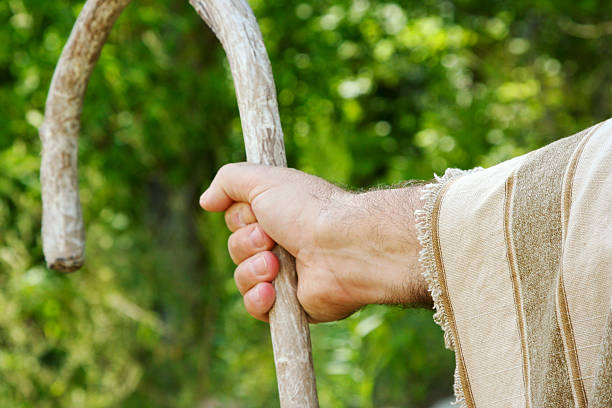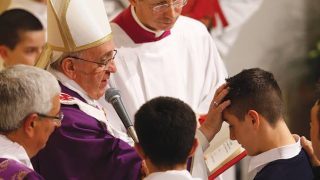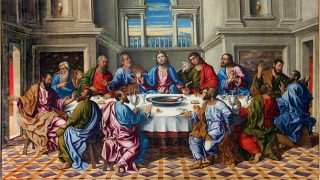
CHRIST THE GOOD SHEPHERD AND THE DOOR
HOMILY FOR FOURTH SUNDAY OF EASTER (GOOD SHEPHERD SUNDAY), YEAR A. Readings: Acts 2:14.36-41; Psalm 23; 1 Peter 2:20-25; John 10:1-10.
Traditionally, on the fourth Sunday of Easter the Church celebrates Good Shepherd Sunday. The gospel reading is usually from John chapter ten which has the parable of the good shepherd read in the three years of the liturgical cycle. Simultaneously the Church celebrates Vocation Sunday, a day of special prayers for those who are “shepherds” in the Church. Practically, when we reflect on the Good Shepherd, we also reflect on the flock and our vocation. Who then is the Good Shepherd and who are the flocks? If some are termed good, then, who are the bad shepherds and flock? What are the qualities expected of the Good Shepherd and flocks? They ought to hear/listen and follow the Master.
Culturally in Israel, being a shepherd is not just a profession, it is a vocation; it is a call to service and sacrifice. It is a deep bond of love, care, protection between the shepherd and his sheep. The shepherd is like a real father to his flock. He takes care of them, guides them and leads them. He is like a doctor or nurse when new flocks are born; he is the nurse when they are sick; when they are weak, he carries them on his shoulder and moves on. Invariably, a good relationship must exist between the shepherd and the sheep, just like the love and unity that exist between the Father and the Son, of whom the quality of a Shepherd is personified in Christ, who is the fulfilment of God’s promises through the prophets.
In fulfilment of these promises, the gospel periscope of today describe Christ as the Good Shepherd who leads the sheep (we) to his Father, that is why he uses two metaphors in this passage in addressing himself as ‘the shepherd who enters by the gate which is the gate keeper’ (v.2-6), and ‘he is the door (or gate) by which the sheep enters into salvation and go out to find pasture’ (v. 7-9). What led to this beautiful passage of the Good Shepherd? Prior to this was the story of the man born blind and the conflicts that arose from it among religious leaders (Jn 9:1-41). The religious leaders have shown themselves to be unhelpful and cruel to the man, his parents and the common people in general that Christ felt it necessary to talk about the contrast between his heart and work as leader to God’s people and the heart and work of many of the religious leaders of His day.
He began by saying, “Truly, truly, I say to you, he who does not enter the sheepfold by the door but climbs in by another way, that man is a thief and a robber; but he who enters by the door is the shepherd of the sheep” (Jn 10:1-2). This brings to mind Ezekiel chapter 34 which speaks more of the shepherds and the sheep. Regarding the civil and spiritual leaders, God rebuked and warned those shepherds of Israel (religious leaders) who were concerned about feeding themselves and not their flock. Shepherds who were motivated by self-interest, capitalizing on their position to extort from their flocks without caring for them in return. No interest to strengthen the weak, nor heal the sick, nor bind up the broken, nor seek what was lost. These shepherds ruled the flocks with force and cruelty (vv. 3-4). Seeing this, God promise to do the work the unfaithful shepherds would not do. He said, “I will search for my sheep and seek them out. I will seek what was lost and bring back what was driven away, bind up the broken and strengthen what was sick; but I will destroy the fat and the strong and feed them in judgment” (11-16). God stopped their exploitation and took up the role of a shepherd. Jeremiah 23:1-4 has much the same emphasis. The Old Testament includes a number of references to God as shepherd and the people as flock (Ps 23:1).
Taking the role of the shepherd, he says, “The sheep hears his voice and he calls his own sheep by name and lead them out” (Jn 10:3). It expresses the personal nature of the relationship that must exist between the shepherd and the sheep. A relationship based on love, truth and mutual respect. A good shepherd knows the sheep with the same kind of intimacy that we have with friends and neighbors. We recall in Jn 20:16 “Mary Magdalene recognizes the risen Christ only when he calls her by her name.” This is a reminder of our baptism that we too were called as individuals by name to accept and follow Christ while he takes the lead as He says, “…I am the door of the sheep” (v. 7).
After using the metaphor of a shepherd, Christ uses metaphor of door/gate to drive his message saying “I am” which is to affirm that he made the promise of old and will take the role of the shepherds. “I Am” is from the Greek word ‘ego eimi’ which is God’s name as seen in the conversation between Moses and God “I Am have sent you” (Ex 3:14-15). Christ remains the Good Shepherd because of the quality of a Shepherd embedded in him. He knows his sheep, he feeds his sheep, he educates his sheep with his doctrines and teachings, he protects and defends his sheep and he gives life to his sheep. These qualities of a shepherd are no doubt seen in Christ. What is expected of the sheep is the response to his call. Just like he called Peter and the other disciples, and made him fishers of men, he calls us today by name.
In the first reading of today, Peter the successor of Christ the Good Shepherd played a pastoral role very well. Through the power of the Holy Spirit, his preaching on repentance and baptism converted three thousand persons in a day. This means a good shepherd, who prepares himself well, and work with the Holy Spirit, is a powerful instrument in God’s hands. A good shepherd must be a man of prayer and always in union with God. He will not tell his sheep to go and pray while he is so relaxed in prayers. He should be a man of example.
In the second reading, this same Peter reminds us that a shepherd must be called by God and be ready to endure for the flocks as Christ did: “For to this you have been called, because Christ also suffered for you, leaving you an example, that you shall follow in his steps. He carried our faults in his own body on the cross” It is expected from every shepherd chosen by God, be ready to suffer and lay down his life for his sheep.
Dear friends in Christ, as we celebrate Good Shepherd Sunday, we are reminded that we are both shepherds and flocks of the Church. In the strict sense, the bishops are our shepherds with their Cruosier and mitre, the symbol of a shepherd and authorities, to guide, teach and lead the people of God by good examples of the qualities of Christ the Good Shepherd. The same is applicable to all clergies to whom the flock of Christ has been entrusted. That is why today is traditionally known as the “World Day of Prayer for Priestly Vocation and Religious Life.” This prayer is needed for us to speak for the people we shepherd and not be silent in the midst of evil and injustice as it is in our decaying nation today. Those expected to be the voice of the people are silent or probably have not done enough. We must decease from enriching ourselves with best treatment at the expense of the flock, which contradicts our call to sacrifice and service. Above all, let us not be among the flocks that only sends destructive criticisms to clerics, but rather help them with our prayers. In fact, by the virtue of our baptism, we all are shepherds in various level: family or societal levels. May Christ our Good Shepherd guide us along the right path. Amen!
Happy Good Shepherd Sunday!
Fr. Ken Dogbo, OSJ










